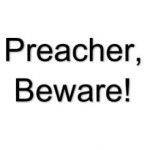Psalm 105:15 – ‘Touch not my anointed’

Psalm 105:14-15 – ‘He let no one oppress them; he disciplined kings for their sake, saying, “Don’t touch my chosen ones! Don’t harm my prophets!”’
This phrase is often thrown around in ‘prosperity gospel’ circles to warn against the dangers involved in criticising God’s ‘anointed’ leaders. (See, for example, Costi Hinn’s God, Greed, and the (Prosperity) Gospel, chapter 3).
Saying negative things about a recognised leader or celebrated preacher can (it is claimed) lead to nasty things happening to you.
The phrase in question is found in Psa 105:15 – ‘Don’t touch my chosen ones! Don’t harm my prophets!’
This command is often linked with 1 Samuel 24:6, where David is recorded as saying to his men: ‘May the Lord keep me far away from doing such a thing to my lord [Saul], who is the Lord’s chosen one, by extending my hand against him. After all, he is the Lord’s chosen one.’
As usual, ‘context is king’. In Psa 105, the instruction is a historical one, harking back to the time when the Lord protected the patriarchs (including Abraham) by restraining foreign kings who otherwise might have overrun them. In 1 Samuel 24, the context relates to a time when David might have harmed Saul, but restrained himself from doing so. The incident is doubly ironic, since Saul had been seeking David’s life, and the former had already been rejected by God because of his disobedience. When Saul was finally killed in battle, the slayer – who thought to gain David’s approval for the act – was actually condemned by David for killing Saul.
It is a long way from these Scriptures to the idea that any modern teachers might be beyond criticism. Saul himself was not beyond criticism: indeed, Samuel rebuked him on a number of occasions. Not only that, but David himself was rebuked by Nathan in the matter of Uriah and Bathsheba (2 Samuel 13)
‘Touch not the Lord’s anointed’ is about harm, not about criticism. Teachers of God’s word should be above reproach. If they fall into false teaching or immoral living, the alarm must be sounded.
Paul was willing to call out heretical teachers by name, and to warn others to keep at a safe distance from them. He warns Timothy:
‘Avoid profane chatter, because those occupied with it will stray further and further into ungodliness,and their message will spread its infection like gangrene. Hymenaeus and Philetus are in this group.They have strayed from the truth by saying that the resurrection has already occurred, and they are undermining some people’s faith.’ (2 Tim 2:16-18)
So also John names a church leader who had decided to ‘go it alone’ in ministry, and whose attitude and behaviour were threatening the peace of unity of the church:
‘I wrote something to the church, but Diotrephes, who loves to be first among them, does not acknowledge us.Therefore, if I come, I will call attention to the deeds he is doing—the bringing of unjustified charges against us with evil words! And not being content with that, he not only refuses to welcome the brothers himself, but hinders the people who want to do so and throws them out of the church!’ (3 Jn 9f)
Yes, and one apostle might even rebuke another to his face:
‘But when Cephas came to Antioch, I opposed him to his face, because he had clearly done wrong. Until certain people came from James, he had been eating with the Gentiles. But when they arrived, he stopped doing this and separated himself because he was afraid of those who were pro-circumcision. And the rest of the Jews also joined with him in this hypocrisy, so that even Barnabas was led astray with them by their hypocrisy. But when I saw that they were not behaving consistently with the truth of the gospel, I said to Cephas in front of them all, “If you, although you are a Jew, live like a Gentile and not like a Jew, how can you try to force the Gentiles to live like Jews?”’ (Gal 2:11-14)
The sad truth is that the leaders and preachers who most want to hide behind ‘tough not my anointed’ are so often the people whose teaching is so dangerous and whose lives are so corrupt.
It is not just zeal for truth, but love itself, which should compel us to speak up and speak out in such cases.
(See this article by Conrad Mwebe)